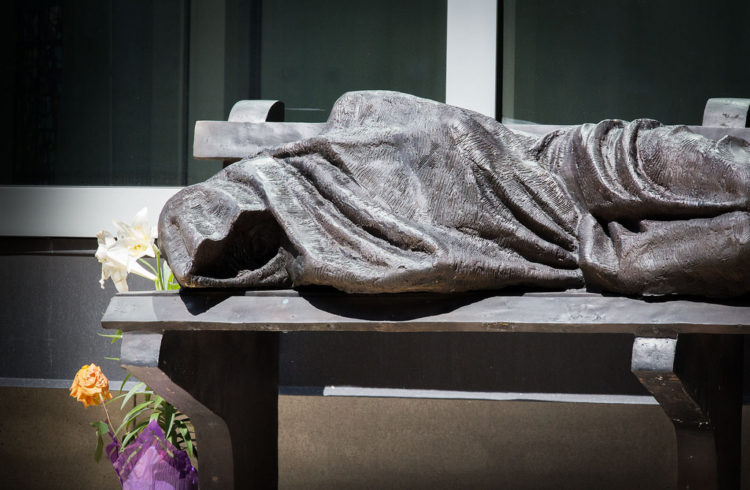Humility is not always the first characteristic we look for in a leader. Our eyes are often clouded by a person’s physical presentation of themselves—their manner of speech or their style of dress. The physical is what shapes our first impressions, then we take a take a look at the facts. We consider resumes and other data points of success, the person’s reputation, or their platform (this includes their clout or perceived number of followers). If there are our primary measures of true leadership, then like Herod, we miss our ideal leadership model.
We often miss true leadership because we overlook the intangibles, those characteristics that are more difficult to measure. Characteristics like honor, courage, and commitment that were engrained in me at the United States Naval Academy, or “J.J. Did Tie Buckle.” This acronym represents the fourteen leadership traits taught to me as a young officer in the U.S. Marine Corps: Justice, Judgement, Dependability, Initiative, Decisiveness, Tact, Integrity, Enthusiasm, Bearing, Unselfishness, Courage, Knowledge, Loyalty, and Endurance.
The measure of true leadership is not just about whether or not someone has risen to the top of their professional fields, it is also about that person’s character, how she or he is shaped, how they think about and treat other people, and what they do in their private spaces. When we ignore these intangibles and overlook these characteristics, we can easily find ourselves attached to the wrong leader. We often miss true leadership because we overlook the intangibles. Click To Tweet
Christ’s Leadership and Humble Beginnings
I’ve been thinking a lot about power lately. Over the past couple years the themes of power, pride, privilege, and poverty have all been swirling in my head. I’ve gone back to the Good Book to see what is taught about these issues, in both the Old Testament and the new. I’ve also surveyed the lives of biblical leaders—those who reflect God’s goodness on earth, and those who seek their own glory.
The Bible is consistent in its leadership lessons and principles. When studying the heroes of our faith, it is evident that God’s ways are not like our ways, and his thoughts are not like our thoughts and this is why we turn to the life, teachings, and story of Jesus.
The Bible records that Jesus was born a baby in an insignificant town, by a young girl who was looked down upon in her community (at least that was the case after her unplanned pregnancy). He came as a Middle Eastern Jewish boy—a person of color.
He learned his earthly father’s trade of carpentry. He became what we now consider a blue collar worker. Before growing into adulthood, his family fled to Egypt. This action was an effort to save his life, so he could grow up and fulfill the purpose for which he was born. He was an alien in a foreign land.
Once he began his earthly ministry, he never had a physical place to call home. We refer to those who have no physical or consistent mailing address as homeless people.
This is the real Jesus. We refer to those who have no physical mailing address as homeless people—like Jesus. Click To Tweet
In his book, A Work of Heart: Understanding How God Shapes Spiritual Leaders, author, Reggie McNeal writes that,
“God uses the common place to shape the leader’s heart.” [The common place] is life in the making. Stuff than nobody pays much attention to or may not even be aware of. Nevertheless, it is the stuff that big moments draw upon. Actions and attitudes that in and of themselves do not necessarily change the course of history. It is what is left over when the spotlight fades.
Jesus—the right leader—was from an insignificant town, “illegitimately” born to a scorned woman as a Middle Eastern Jewish boy, a person of color, who came from a blue collar working family, became an immigrant, and he spent a good portion of his adult life as a homeless person. This is the earthly stuff that he drew upon when he announced his earthly ministry. This stuff indeed fueled the actions that changed the course of history.
Right leadership means the proclamation of freedom for those who are sick, suffering, and oppressed. His mother proclaimed this truth before his birth.
He has brought down rulers from their thrones but has lifted up the humble. He has filled the hungry with good things but has sent the rich away empty (Luke 1:52-53).
Jesus, himself, proclaimed this truth and the fulfillment of Old Testament prophecy with a reading from the prophet Isaiah. This is the announcement of his public ministry:
The Spirit of the Lord is on me, because he has anointed me to preach good news to the poor.
He has sent me to proclaim freedom for the prisoners and recovery of sight for the blind, to release the oppressed, to proclaim the year of the Lord’s favor (Luke 4:18-19).
This announcement of the kingdom of God is now. Since the words left his lips, the revelation became a present reality. “Today this scripture is fulfilled in your hearing (Luke 4:21).”
Through the Spirit of the Lord and through the humble obedience of Jesus, the poor in spirit and the physically poor all receive good news! Those who are enslaved to sin and death, and those who are physically in prison can be set free. Those who are spiritually blind and physically sick can be healed. Those who are oppressed and casted down, will receive freedom and be lifted up.
Right Leadership, Wrong Way
For Jesus to embody the right leadership, he had to humble himself—take a very low road. This idea of lowering ourselves is a foreign concept for those who call themselves leaders. Indeed, in a country that prides herself on individuality, the exerting of personal rights, and pulling ourselves up by our own boot straps, the idea of lowering ourselves sounds and feels very wrong.
We need to understand, however, if we call ourselves Christians, and if we truly consider ourselves leaders and Christ-like influencers in the world, we must become poor.
The Apostle Paul extends this invitation into Christ’s humility. In Philippians 2:3-11, he writes that we are to “do nothing out of selfish ambition or vain conceit, but in humility consider others better than yourselves. Each of you should look not only to your own interests, but also to the interests of others (Phil 2:3).”
The invitation to poverty requires us to look beyond our own interests, and consider the needs of others. Selfish ambition and vain conceit are enemies of God and his kingdom advancement. They reflect the wrong way to lead.
Poverty means that we consider others better than ourselves. This is the right way.
Our attitude must be the same as Christ Jesus who is God, and yet he made himself nothing. He left his divine state of being and took on humanity, being the very nature of a slave (according to the original Greek language). As a man, he humbled himself and became obedient until his demeaning capital punishment was completed.
Because of his humility, obedience, and self-less sacrifice, God the Father raised him up to the highest place of honor, where he will be worshiped on earth and in Heaven by every human and created thing to the glory of God our Father. (Philippians 2:5-11)
The glory comes as a right response to his poverty and ultimate sacrifice. And it must not be lost on us this glory came as a result of his giving up power to lower himself and be like us.
He gave up personal power to provide freedom and to empower generations and diverse classes of people who all freely have access to enter into his kingdom. Empowerment of a people does not come without personal sacrifice.
The empowerment of a people does not come by demanding or preserving our own rights, or by constantly reminding ourselves how great we are. This is the wrong way.
We are not all that great. An impoverished soul sings, “How great thou art.” It is through this simple expression with every knee bowed and every tongue confessing that we truly see the right leadership, real Jesus and his divine power at work. Empowerment of a people does not come without personal sacrifice. Click To Tweet










Missio Alliance Comment Policy
The Missio Alliance Writing Collectives exist as a ministry of writing to resource theological practitioners for mission. From our Leading Voices to our regular Writing Team and those invited to publish with us as Community Voices, we are creating a space for thoughtful engagement of critical issues and questions facing the North American Church in God’s mission. This sort of thoughtful engagement is something that we seek to engender not only in our publishing, but in conversations that unfold as a result in the comment section of our articles.
Unfortunately, because of the relational distance introduced by online communication, “thoughtful engagement” and “comment sections” seldom go hand in hand. At the same time, censorship of comments by those who disagree with points made by authors, whose anger or limited perspective taints their words, or who simply feel the need to express their own opinion on a topic without any meaningful engagement with the article or comment in question can mask an important window into the true state of Christian discourse. As such, Missio Alliance sets forth the following suggestions for those who wish to engage in conversation around our writing:
1. Seek to understand the author’s intent.
If you disagree with something the an author said, consider framing your response as, “I hear you as saying _________. Am I understanding you correctly? If so, here’s why I disagree. _____________.
2. Seek to make your own voice heard.
We deeply desire and value the voice and perspective of our readers. However you may react to an article we publish or a fellow commenter, we encourage you to set forth that reaction is the most constructive way possible. Use your voice and perspective to move conversation forward rather than shut it down.
3. Share your story.
One of our favorite tenants is that “an enemy is someone whose story we haven’t heard.” Very often disagreements and rants are the result of people talking past rather than to one another. Everyone’s perspective is intimately bound up with their own stories – their contexts and experiences. We encourage you to couch your comments in whatever aspect of your own story might help others understand where you are coming from.
In view of those suggestions for shaping conversation on our site and in an effort to curate a hospitable space of open conversation, Missio Alliance may delete comments and/or ban users who show no regard for constructive engagement, especially those whose comments are easily construed as trolling, threatening, or abusive.